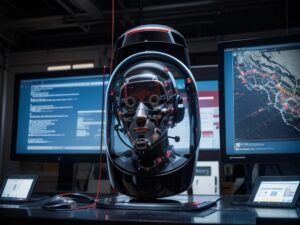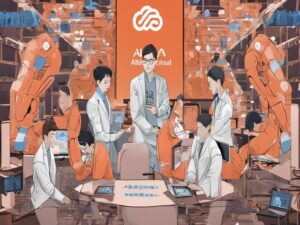
AI in Job Hiring is changing the face of recruitment through innovations in processes, decision-making, and candidates’ experience. Businesses are also beginning to incorporate AI technologies into their frameworks to be on the same level as other organizations and to attract the best workforce. Here are various approaches in which AI is revolutionizing the hiring processes In the following section, we dissect several methods through which artificial intelligence is shaking up the hiring process.
Resume Screening
Recruitment through resume databases is also facilitated by the use of AI. These systems can scan through thousands of resumes quickly and select the most appropriate candidates calibrated against certain set standards. This not only saves much time but also eliminates human bias in the first stage of the sorting of information. AI in job hiring also presents benefits to recruiters as it filters the candidates which worth their attention.
Interview Scheduling
Thus just scheduling the interviews could be chaotic. AI can also do that; thus, saving the time that would otherwise be spent on preparing the calendars and scheduling the interviews. This makes the usage of AI in job hiring inevitable because it helps both parties bounce through a smoother process.
Candidate Assessment
Hire tests, for instance, coding tests or personality tests help to present honest evaluations of the candidate regarding his/her skills and compatibility with the company’s culture. These tools provide information that is broader in context and therefore a better way of evaluating the applicants for hiring.
Employee Retention
AI can also help in forecasting employee turnover patterns and behavior. This extends the opportunity for the companies to act as early indicators by giving keen notices on how they can retain employees. Through the use of AI in the aspects of employment, employees will be kept and satisfied in an organization.
Bias Reduction
Another advantage that AI applies to job hiring is that it can help eliminate prejudices at the unconscious level. When designing the algorithms, it is possible to ensure that they only consider a person’s qualifications and experience, thus eliminating personal bias. This results in a diverse composition of the workforce in places of work.
The Role of AI in Resume Screening
AI in job hiring is also driving change in how organizations go through the process of recruiting the right workforce. The initial process of reviewing resumes manually if not efficient is very labor-intensive and riddled with high chances of mistakes. The use of AI in job hiring means that companies will be in a position to handle voluminous applications that make the screening process elaborate, thus having filters that only allows the right talents for further assessment.
Efficiency and Speed
Resume screening is one of the main areas that benefits from AI application in the process of job recruitment since the process of scanning through large numbers of resumes is greatly enhanced and accelerated. Many algorithms of AI can scan through hundreds or even thousands of resumes in a matter of minutes, something that would take the recruiter hours if not days. This also means that companies can put people on the payroll faster and therefore manage to keep the time-to-hire factor in mind which is an important element of the productivity equation.
Unbiased Screening
AI in the hiring of employees eradicates prejudice at the preliminary stage of a candidate’s consideration for a position. The AI algorithms can be taught to filter out characteristics that aren’t related to the job such as gender, age, or ethnicity and pay attention to the qualifications and experience required by the job. This helps in increasing diversity in workplaces as the candidates are placed on equal ground when it comes to being hired.
Enhanced Accuracy
The resume screening is thus enhanced when AI is used in the recruitment process of any company. Resume databases can be set in such a manner that they will search for certain keywords in relation to the job description and only allow resumes that contain such keywords to be filtered out. This eliminates the possibility of missing good candidates and extends the likelihood of getting the ‘best’ candidate for the position.
Cost-Effectiveness
AI application in job hiring can also save costs. Early use of automated resume filtering decreases the necessity of numerous recruiters and, therefore, decreases spending on personnel costs. Another advantage is the shortening of time required to fill the positions, which in turn decreases the expenses of open positions and inefficiency.
Constant Learning and Adaptation
AI in job hiring is not set in stone; it evolves as it is always training to become a better screener. Indeed with more data went through, the algorithms improve and thus candidate matching improves over time. This makes the companies to be in a better position in the already established competition of job markets.
AI-Powered Applicant Tracking Systems
The use of AI in job hiring is changing the trends and patterns of hiring employees in different organizations. The incorporation of AI in applicant tracking systems helps to improve the performance of both the recruitment process and the ATS.
Streamlining Resume Screening
Job seeking is another area where AI comes in handy; specifically, AI makes it possible to sort through candidates’ resumes. The manual techniques are rather cumbersome and often tend to be erroneous due to the limitations of the human brain. Modern ATS supported by AI can scan thousands of resumes within minutes and sort them according to the client’s preference. This makes the process more structured and less prone to the candidates’ prejudice on the side of the employer.
Enhancing Candidate Matching
AI in job hiring means the use of new algorithms that help in matching job seekers with employers more properly. These systems employ the use of NLP and machine learning to be able to interpret the requirements of a particular vacancy and match them with the resumes of candidates in the best way possible rather than just mere keyword matches. This leads to the attainment of better quality employees, as well as enhanced satisfaction levels of employees.
Improving Communication
Applicant tracking systems integrated with artificial intelligence positively influence the effectiveness of communication between recruiters and candidates. Communication with the initial candidates can also be done by automated messages; setting up interviews; informing candidates on the status of their application. This averts candidates’ disengagement and lack of information, thus, making their experience relevant and lowering the drop-off rates.
Data-Driven Decision Making
The application of artificial intelligence in hiring gives insights that come with the data analysis. AI is used to sift through vast amounts of data with a view of coming up with trends and patterns that are useful in the recruitment process. It helps companies understand the strategies and placements of job descriptions to enhance and acquire a successful hiring process.
Reducing Time-to-Hire
The use of artificial intelligence increases the speed of business processes which, in turn, reduces the time-to-hire. Ordinary methods of hiring may sometimes take days, weeks, or even months, while AI recruiting is much faster, for it only may take days. This is not only cost-effective but also assures the organization of locking the most competent candidates before they are snapped up by other organizations.
Enhancing Candidate Experience with AI
The use of Artificial Intelligence in job hiring is changing the face of recruitment by providing prospects of enhancing the experience of the candidates as never before. Advanced AI that can be taken into organizations provides more efficient hiring processes that are free from bias.
Personalized Job Recommendations
The current intelligent-assisted platforms employ analytical tools on candidates’ profiles and job vacancies and subsequently recommend suitable jobs. Immensely time-effective for job seekers and makes sure that they are placed in the best relevant jobs of their choice.
Automated Communication
Employment of Artificial Intelligence in job recruitment entails computerized communication from the stage of candidate attraction to the final stage of appointment. They can answer the first questions, set up interviews, and send updates; candidates should never be out of the loop. It also ensures that the candidate is informed constantly and this makes them feel valued hence improving their experience.
Bias Reduction
Tools developed with the help of Artificial Intelligence can minimize the chances of discrimination during the hiring process. As such, AI intimidations do not stem from prejudices related to a candidate’s personality type, but with specific qualifications and experiences, which makes the selection process much fairer. This is good because it increases candidate experience while at the same time offering opportunities to diverse talent.
Efficient Screening
Any administration of artificial intelligence when it comes to hiring the job can take a shorter time to make its selections. Recruiting software can easily go through the resumes, identifying a candidate in line with the set attributes. It also has the added advantage of isolating the best-qualified candidates and contacting them earlier and faster.
Interactive Assessments
AI technologies provide interactive and adaptive detailed assessments to the candidates compared to the traditional approaches of assessment. Such tests can provide a quantitative result as a confirmation of the surveyed candidate’s qualification and suitability for the position offering instant feedback. Such tools make the evaluation process more distinct and descriptive to the candidates regarding employing organizations.
Enhanced Data Analysis
Applying AI in the hiring of employees makes it easy for organizations to sort through mountains of data. This enables sound decision-making and hence strategic formulation, identification, and recruitment of the best candidates hence proper touring and selection. Greater data analysis capability also assists in monitoring and increasing the quality of the recruitment process.
AI in Conducting Initial Interviews
AI in job hiring is fast changing the traditional face of hiring through facilitating the first-approach interviews. This approach is quite efficient meaning that through this companies will be in a position to identify and select the readily available talent in the market.
Enhanced Candidate Screening
The application of an advanced intelligent system facilitates the enhancement of the recruiter’s capability in screening the candidates. Using machine learning and big data analysis, unnecessary and unqualified employees are eliminated through CV scanning. This helps in filtering only the most eligible candidates. the next level.
Improved Candidate Experience
AI in job hiring also increases the candidate experience as he or she gets feedback and updates almost instantly. Specifically, automated systems are capable of providing the candidates with the status of their applications as well as sending letters to them. This improves satisfaction and consequently the interaction between the candidates and the company.
Bias Reduction
Another benefit that is notable with AI hiring is the elimination of prejudice in the process of recruitment. AI reduces the level of various human biases that may interfere with decision-making as AI algorithms rely on facts and set metrics. This results in an increased employee population with developed diverse views.
Scalability and Efficiency
AI makes ‘scaling’ simple so that companies can accommodate a massive volume of applications. This is greatly advantageous for organizations that are likely to have thousands of applicants for a specific job. Every application received for a certain position is analyzed and evaluated promptly by the AI systems, which is time-saving for the HR team.
Data-Driven Insights
Thus, AI in job hiring is useful in offering data relevant to the recruitment process that enhances hiring approaches. AI can also categorize the trending and patterns of the recruiting channels, where there is a need for improvement, and where the future forecasted demand for hiring will be.
Reducing Bias in Hiring with AI
AI in job hiring is disrupting the recruitment industry through the lens of removing the biases, which have always been present in the application process. Applying sophisticated algorithms and data analysis, AI provides a fair approach to candidates’ selection, including various categories of people at the workplace.
Enhancing Resume Screening
AI therefore comes in handy in the screening of applicants within companies and only the qualified ones are short-listed. Historical techniques could lead to personal prejudices creeping into the process, while with the help of an AI system, the application is assessed based on the parameters set and not qualities such as gender, race, etc. This leads to a better assessment of the candidates with less bias making the resourcing process much more equitable.
Standardized Interview Processes
Interview robots assist in making the interview process more uniform by presenting questions that are factual and judging the responses systematically. This reduces the impacts of biases from the interviewer supposing they have so, then the impacts will be reduced since every candidate will be judged according to the same set standards. The incorporation of natural language processing and sentiment analysis takes the measures a notch higher toward being more objective.
Bias Detection and Mitigation
In this regard, it should be noted that hiring bias AI systems can be configured to identify such biases. It works with big data and being able to single out anything in the set data that is considered biase. Employers can then also intervene with a view of reducing these biases towards candidates from specific groups, which will enhance the fiscal recruitment environment.
Data-Driven Decision Making
AI in job hiring allows for rational decisions in the hiring process. This way, AI encompasses data from different levels of the hiring process, allowing one to evaluate effectiveness and define potential problems. Thus, the employment decisions that are made are more transparent and accountable through such an approach focusing on data.
Continuous Learning and Improvement
Another unique aspect of artificial intelligence in the process of employment is that it is adaptive. More data through more processed by AI means that the systems can detect those biases as well as implement measures to make the system fairer. This cycle of learning assists organizations in evading lagging in the new standards of diversity and inclusion.
Predictive Analytics for Candidate Success
AI in job hiring is relieving the pressure of human interaction when it comes to recruitment through the predictive methods of analytical recruitment. The given change is helping companies to get new approaches to promote decision-making and reach greater candidate outcomes.
Enhancing Candidate Screening
Screening tools designed with the help of artificial intelligence technologies compare a huge number of indicators to assess resumes and application forms. With such tools using machine learning algorithms, it is possible to define how the employee is likely to perform in a particular position. This process is time-saving, and it also eliminates the factor of prejudice by humans, hence making the chances of hiring a good employee more equal.
Predicting Job Performance
The use of personal predictions in AI allows the recruiters to not only see how the candidate will perform in the required job but also how they will perform in the future. Even though based on pre-employment test results, AI filters historical data and evaluates KPIs to determine the likelihood of selected applicants’ success on the job. This can help companies come up with better hiring decisions to get key people that will help boost the company’s fortune in the long run.
Improving Candidate Experience
AI in job hiring also benefits the candidates by giving them timely feedback on their applications and on the process that they are subjected to. Candidate communication is maintained using automated communication systems and candidates can be supported or their queries answered by chatbots. This creates a positive image of the company and such companies have a higher probability of attracting good employees.
Reducing Turnover Rates
With predictive analytics, organizations can be able to predict candidates that not only meet the standard of the job but also are best suited to the organizational culture. This alignment also helps avoid getting new hires to resign before they produce necessary results for the company hence, lowering turnover and some costs. AI in job hiring also assists in arriving at a more committed and stable workforce.
Automating Administrative Tasks in Recruitment
The HR in the current world is transforming with the help of AI in job hiring, making the process easier and more efficient. Through the automation of several activities in the hiring process, AI is proving beneficial to HR professionals as it cuts down costs within the undertaking.
Streamlining Resume Screening
One of the typical and quite time-consuming activities in recruitment is sorting through numerous applications and CVs. This is solved by AI in job hiring where the large number of applications is sifted through using automated resume filters. Due to the use of highly developed algorithms, one can easily sort and select resumes with relevant qualifications in the least time possible. This not only accreditation process but also cuts the time factor and minimizes bias which most conventional methods have.
Enhancing Candidate Communication
It is also evident that communication with the candidates plays an important role in the overall hiring process experience. It is possible to use the AI for the first-part candidate inquiries conversation, interview scheduling, and updates on the status. This helps maintain constant communication with the candidates and thus makes the experience much better for them.
Automating Interview Scheduling
Synchronization of the interview times may be another issue that may arise. Thus, when it comes to employing the system of sorting the candidates in job hiring, the process of scheduling is made easier through the help of AI. The application can allocate the schedule of the interviewer with the schedule of candidates by sending out calendar invitations and follow-ups. This helps to eliminate the back and forth that is usually involved in the scheduling so that there will be proper flow.
Data-Driven Decision Making
This paper aims to identify how AI in job hiring improves decision-making through the analysis of recruitment information. Metrics such as the TTH for the campaign, the CPC for the campaign, and the CSE or Candidate Source Effectiveness can be evaluated for the campaign. This information is useful in allowing the HR teams to improve on the various areas of recruitment to achieve the best possible results.
Case Studies of AI in Job Hiring
AI in the recruitment process for employment has been changing the course in different fields of employment over the recent past. In this framework, AI is fostering efficiency, decreasing prejudice, and upping candidate experience for businesses. Here is how AI is indeed transforming the world in the following ways:
Automating Resume Screening
The use of AI in the hiring process is already going beyond expectations to enrich the screening activity. Classic CV search has disadvantages related to time consumption and the possibility of human mistakes. Employing the use of AI in screening resumes means that the heap of applications that can be received can be easily scanned for specific skills or educational backgrounds. Unlike the traditional method, this automation of the process not only saves time but also reduces the number of candidates to be considered the most qualified.
Minimizing Bias in Serials of Candidates
Another vibrant field that is growing in terms of AI in job hiring is the elimination of bias. However, human recruiters are very likely to subconsciously implement their stereotype-related assumptions when searching for the ideal top talent. Indeed, when properly designed, AI promotes work-equal opportunities free from bias and prejudice since the algorithms are only programmed to look at the abilities of the candidates and their experience in the field. This assists in coming up with a place of work that is more diverse as well as embracing various employees’ diversity.
Enhancing Candidate Experience
Another critical area of how AI applies itself in the hiring process is the enhancement of the experience of candidates. Friendly chatbots and virtual assistants give applicants an immediate overview of their questions and how to apply. These tools increase the level of interaction and communication with the candidates to make them aware of the progress of the hiring process.
Impact of Using Predictive Analytics in Hiring Decisions
Other changes in job hiring are brought by predictive analytics, which is powered by artificial intelligence. Through handling large datasets, AI can determine what the candidate will perform in the future and his/her adaptability to the organization’s culture. Such an approach helps the recruiters select the right people for the job, which will reduce cases of turnover in the workforce.
Streamlining Interview Scheduling
In the case of hiring jobs also, AI technology is helping in the regular interview schedule. It can be confusing to arrange the interviews, however, that can be solved with the help of AI filters, which can synchronize calendars, and find the time convenient for both candidates and interviewers. This cuts short the process of hiring and enhances the normal flow of the hiring process respectively.
Challenges and Limitations of AI in Hiring
Nevertheless, AI has already dramatically impacted the job hiring process; however, AI is not beyond its vices and imperfections. This is one of the reasons why one of the major concerns is the issue of bias. Machine learning algorithms are only as far as the data provided to them to learn from. Consequently, since the information is historical data, the AI system will tend to learn biased data. Maintaining diversity in employees remains an issue of great concern whenever AI is solely applied in the hiring process.
The last downside is that it is not very transparent. Most AI systems work in a ‘black box,’ thus limiting the chances of the HR professionals to be able to appreciate how decisions are made. This results in some level of mistrust and caution when implementing purely AI-based staffing technologies. Besides, applying AI in the employment process is troublesome with emotions and interpersonal communication. In some areas,
AI works effectively in sorting as well as ranking resumes, and then selecting candidates based on competencies it may lack the capacity to select or infer qualities like emotional intelligence, cultural match, and interpersonal communication. These are all key components of workforce selection and when left out lead to unsuitable staffing decisions or choices. Another critical issue is the protection of individuals’ data or private information.
Ott and Gococks (2014) pointed out that the huge data accumulation through personal data collection and processing to develop Artificial Intelligence requires a query on the storage, usage, and protection of such data. This means that there should be legal compliance with data protection laws to avoid running into legal issues. However, there is also a limit to technology as a factor encountered in the study as well. For instance, AI systems have to be updated and adjusted from time to time so that they would still work well.
Maintaining such a system can be very tedious and at the same time very costly in terms of financial and time resources. Finally, there is a problem of dependency on AI in hiring of employees. Despite numerous benefits of the application of AI in recruitment, artificial intelligence overruns the process and poses certain dangers, particularly the extreme unlikelihood of human contact in the recruitment process decreases the candidate’s prospect experience.
Future Trends in AI for Recruitment
Concisely, AI in recruitment is a radical transformation process that is making jobs in hiring better and efficient. There are several advantages in this succession that are changing the manner and ways that firms used to source and engage employees.
Enhanced Candidate Screening
HR departments can utilize programs, which may analyze resumes and cover letters significantly faster and perhaps even more accurately, thus providing the list of candidates satisfying the pre-specified criteria. This process of narrowing is advantageous in the sense that recruiters can target the cream of the crop hence saving their time and energy that would otherwise be used in sifting through large numbers of applicants.
Data-Driven Decision Making
AI in job hiring works through data analytic by offering information on behavior, competence, and contractors’ compatibility with the company. Through huge data analysis AI can assess which candidates meet the criteria of performing well on the job and in turn assist in making better decisions in hiring.
Improved Candidate Experience
Chatbots and virtual assistants powered by artificial intelligence demonstrate live answers to questions, fix interviews and send updates throughout the recruiting process to the candidates. Not only does this increase communication with the candidates but it also keeps them informed and less bored.
Diversity and Inclusion
Machine learning packages can be determined to have reduced bias and therefore help in increasing Diversity and inclusion in the workforce. Thus, by utilizing the set of criteria to rank the candidate objectively, AI contributes to the creation of a more equal hiring environment.
Automated Administrative Tasks
Application scheduling for interviews, conducting background checks as well as other on boarding procedures can be conducted with the help of AI in job hiring. Thus, the automation minimizes the work load of HR teams and enable them to improve on their strategic activities that generate value to the organization.
Continuous Learning and Improvement
AI systems adapt from the previous cycles in hiring and can enhance the algorithms to produce better results in subsequent hiring. This feature guarantees that the recruitment process improves and adapts to the recruitment needs of the market and the organization.
Conclusion on AI Transforming the Hiring Process
With the use of artificial intelligence in job hiring, this is changing the way companies get, assess and source for talent. It means that the decision to integrate artificial intelligence in recruitment has multiple benefits that walks from increasing efficacy to the lack of bias. Using AI systems it is easy to sort out numerous applications fast and show the best applications that meet the criteria that have been set.



